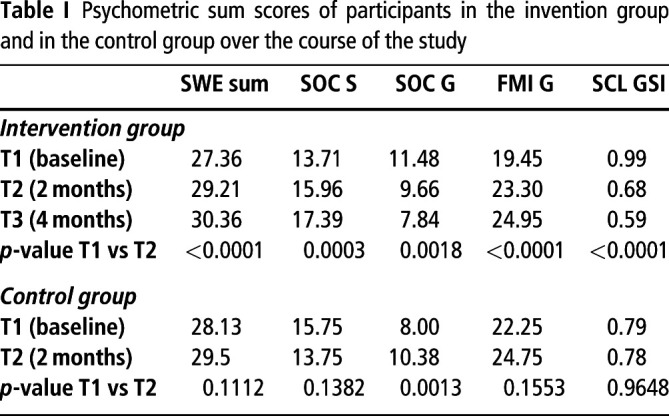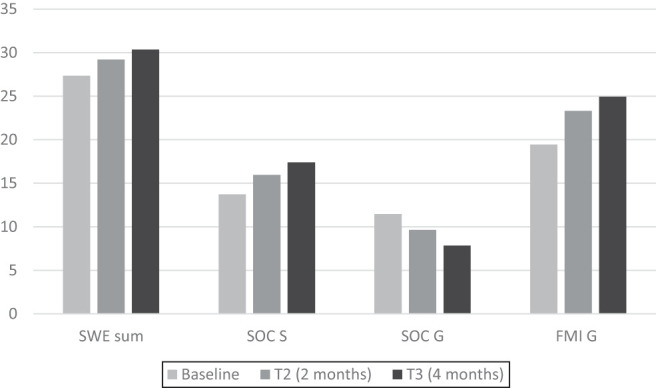Effects of nature-based mindfulness training on resilience/symptom load in professionals with high work-related stress-levels: findings from the WIN-Study.
IF 1.8
Q1 PSYCHIATRY
引用次数: 6
Abstract
Purpose The levels of work-related stress and the incidence rates of subsequent related illnesses are increasing in our society, leading to high individual and socioeconomic burdens. Mindfulness training has been shown to be an effective method of improving stress resilience. This paper aims to investigate the efficacy of nature-based mindfulness training in professionals with high levels of work-related stress. Design/methodology/approach In this controlled pilot study, a total of 56 volunteers completed a nature-based mindfulness training progam and were compared to 8 participants (waitlist controls). Psychometric assessments were performed at baseline and after two and four months of training. Findings After two months of training, the scores for self-efficacy, sense of coherence, level of mindfulness and overall psychiatric symptom load had significantly improved in the intervention group, while the control group did not show any significant improvements. A comparison between the intervention and control groups showed a significant difference regarding the sense of coherence only. Research limitations/implications Since this was an exploratory study with a small control group, further studies are needed to verify our findings. Practical implications In conclusion, nature-based mindfulness training seems to be a promising tool for the improvement of resilience and overall psychological health in professionals. Originality/value This was the first study to systematically investigate effects of nature-based mindfulness training in people with high work-related stress.


基于自然的正念训练对高工作压力专业人员的恢复力/症状负荷的影响:win研究的结果
目的:在我们的社会中,工作压力的水平和随之而来的相关疾病的发病率正在增加,导致了很高的个人和社会经济负担。正念训练已被证明是提高压力恢复能力的有效方法。本研究旨在探讨基于自然的正念训练在高水平工作压力专业人员中的效果。设计/方法/方法:在这项对照试验中,共有56名志愿者完成了一项基于自然的正念训练计划,并与8名参与者(候补组)进行了比较。心理测量评估分别在基线和训练后2个月和4个月进行。结果:经过两个月的训练,干预组的自我效能感、连贯感、正念水平和整体精神症状负荷得分均有显著改善,而对照组无显著改善。干预组和对照组之间的比较显示,仅在连贯感方面存在显著差异。研究局限性/启示:由于这是一项小型对照组的探索性研究,需要进一步的研究来验证我们的发现。实践意义:总之,基于自然的正念训练似乎是一种很有前途的工具,可以提高专业人员的弹性和整体心理健康。独创性/价值:这是第一个系统地调查基于自然的正念训练对工作压力大的人的影响的研究。
本文章由计算机程序翻译,如有差异,请以英文原文为准。
求助全文
约1分钟内获得全文
求助全文

 求助内容:
求助内容: 应助结果提醒方式:
应助结果提醒方式:


